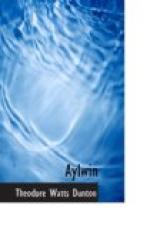The next day I was again at Wynne’s cottage, and the next, and the next. We two, Winifred and I, used to stroll out together through the narrow green lanes, and over the happy fields, and about the Wilderness and the wood, and along the cliffs, and then down the gangway at Flinty Point (the only gangway that was firm enough to support my crutches, Winifred aiding me with the skill of a woman and the agility of a child), and then along the flints below Flinty Point. She rapidly fell into my habits. She was an adept in finding birds’ nests and wild honey; and though she would not consent to my taking the eggs, she had not the same compunction about the honey, and she only regretted with me that we could not be exactly like St. John, as Graylingham Wilderness yielded no locusts to eat with the honey. Winifred, though the most healthy of children, had a passion for the deserted church on the cliffs, and for the desolate churchyard.
It was one of those flint and freestone churches that are sprinkled along the coast. Situated as it was at the back of a curve cut by the water into the end of a peninsula running far into the sea, the tower looked in the distance like a lighthouse. I observed after the first day of our meeting that Winifred never would mount the tower steps again. And I knew why. So delicate were her feelings, so acute did her kind little heart make her, that she would not mount steps which I could never mount.
Not that Winifred looked upon me as her little lover. There was not much of the sentimental in her. Once when I asked her on the sands if I might be her lover, she took an entirely practical view of the question, and promptly replied ‘certumly,’ adding, however, like the wise little woman I always found her, that she ’wasn’t quite sure she knew what a lover was, but if it was anything very nice she should certumly like me to be it.’
It was the child’s originality of manner that people found so captivating. One of her many little tricks and ways of an original quaintness was her habit of speaking of herself in the third person, like the merest baby. ‘Winifred likes this,’ ’Winifred doesn’t like that,’ were phrases that had an irresistible fascination for me.
Another fascinating characteristic of hers was connected with her superstitions. Whenever on parting with her I exclaimed, as I often did. ‘Oh, what a lovely day we have had, Winifred!’ she would look expectantly in my eyes, murmuring, ‘And—and—’ This meant that I was to say. ‘And shall have many more such days,’ as though there were a prophetic power in words.
She talked with entire seriousness of having seen in a place called Fairy Glen in Wales the Tylwyth Teg. And when I told her of Oberon and Titania, and A Midsummer Night’s Dream, whose acquaintance I had made through Lamb’s Tales from Shakespeare, she said that one bright moonlight night she, in the company of two of her Gypsy playmates, Rhona Boswell and a girl called Sinfi, had visited this same Fairy Glen, when they saw the Fairy Queen alone on a ledge of rock, dressed in a green kirtle with a wreath of golden leaves about her head.




